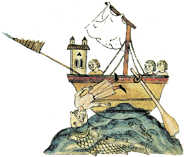A List Of Things In My Brain Meant To Be Told And Savored For An Uneventful Day
1st Thing
My cousin from Atlanta read the blog. He said that he heard many different voices in my writing. I tried to explain that I like to use many different voices when I write. I like the parenthetical notation, the "on second thought", the after thought. He said that he thought it was multiple personalities and started to laugh. It reminded me of when I was talking to my stepmother about Jason's Lyric I think. I told her it was a good movie, but could have been a great movie if the plot was tweeked this way or that. She then said she did not think it was that deep. She is an accountant.
I think that through my blog, my cousin has seen a part of me that he is not sure that he likes. I am a cynic. And he is not. And now I wonder how he missed that part of me. I think that it is because with family I am a bit different as we all are. I just shut my mouth most of the time because if you mumble in a southern home there is always aunt Dorothy or Peggy asking you to repeat yourself. And sometimes they laugh and sometimes they don't. But me and Stan are always meeting in DC, LA or Atlanta outside of all that. I wonder how he missed my cynical side. I wonder if the line of demarcation is drawn by my pre-formed persona -- my performance of sorts -- or his perception of me?
2nd Thing
I
I have been reading J's Theater. His blog is like the damn New York Review of Books. It is an education unto itself on all things deep. J mentions in his January 7th post the death (apparently suicide) of the Brazilian head of the United Nations peacekeeping force in Haiti General Urano Texeira da Matta Bacellar. This is unnerving. First, I wonder what he saw and who he confided in concerning the turmoil that has hit Haiti. Second, J mentions La Tortue, who I believe has good intentions, but returned to his homeland in a power brokering position with little idea of how bad things were in terms of the everyday life of the average Haitian. I remember when the floods happened in Gonaives, the look of disbelief on his normally big and jolly African chieftain face. I remember him saying that the people of Haiti were suffering neglect. And for that split second I remember the look on my father's face when we were working in Jersey City after I got out of college. It was as if my father left his upper-middle class world for the first time and entered the inner city for work. That world was one he was very unfamiliar with, growing up on a farm and all. But, when he worked with the people and saw the dilapidation, he felt as if things had been neglected. For him, it was the same as walking out of a house in 1962 and returning in 1993 to find the wallpaper had buckled and bubbled; the ceiling's leaks vibrating outward in brown rings; and, the stray animals walking in and out of his old home seeming less than vagrants. And looking at La Tortue, I saw that glimmer in his eye. An entire mountain was moistened and slid down upon this city of Gonaives, what could he do? There is no amount of career idealism masked as administrative experience that can combat such a situation. And in the end, what good is all of the words and cultural knowledge in the shadow of such violence. Super literacy does not defeat illiteracy as much as we may like to think that it does. I have not keep up with Haiti as much as I used to in the last year since I got knocked on my ass. But the despair and senselessness of the situation is mind numbing to me.And that is the feeling I hear in peoples voices concerning Haiti. And now, I am hearing it in the voice of people who study the Caribbean and want to champion it. It is a level of tiredness coming from the intellectual class in this aftermath of 200 years of independence. Something that looks so vainglorious in history presentations, slave conferences, linguistic studies and literary critiques, but in reality is far less. It is ashen, with black skins thrown from here to there. Running in the mud. Eating cakes made from clay and salt, baked in the sun.
One friend and researcher talked about "that being Haiti"when confronted with the severity of the situation. Another friend that bailed from the halls of a literature department into an administrative position said "things will never change" after her work there trying to empower Haitian women. And the latest came from a department head. Upon hearing my history thesis idea concerning the idea of Haiti in the late 18th/early 19th century formation of PanAfricanism (still in the air, whole project still pending, I want a real job), said: "What is wrong with Haiti? It has been 200 years. They haven't gotten it together yet." And her family is from Martinique. After testing my French (I failed in pronunciation of a certain word) I was dismissed from her office -- nicely I must add, and with good advice concerning the politics of the university. She seemed to be a real meat eater and a cynic. Good for surviving the rigorous bullshit of university posts.
So, upon hearing of this suicide I became a little depressed again. Brazil has been doing things here and there for Haiti. The Brazilian football/soccer team played in Port-au-Prince a little over a year ago. And the high profile of the Brazilian lead UN forces coupled with the newly elected Lula made me think that somehow a real PanAmerican effort to save Haiti could be forming. But now, it all seems to be a downward spiral with very little chance of a significant change. Did the UN ever get the requested number of troops for the Haitian crisis? And as long as our current political landscape stays the way it has, and as long as the United Nations is over stretched with disasters in Africa and Southeast Asia the 8.5 million castaways on "that half" of that unspecific island in the Caribbean will be stranded at sea. I wonder who notices.
II
Still working on links. Hope to have it mapped out soon.I decided to pick up one of the few things I have been able to salvage from my life's recent tumble to middle Tennessee (Middle Earth). When I got back from Germany last year, I decided to pick up a copy of the magazine BOMB. The Winter 2004/2005 issue is dedicated to Haiti. I have not finished reading the whole thing one year later. I skipped the Stuart Hall interview with David Scott, but read the majority of the issue before shelving it. After the suicide of the UN General I decided to revisit the Evelyne Trouillot interview conducted by Edwidge Danticat.
When I read it last year I was interested because I had read Haiti, Nation Against State by Evelyen Trouillot's brother Michel-Rolph Trouillot in Germany. I checked it out of the University of Tuebingen's Political Science Library while I was working between there and Reutlingen. The book was recommended by one of my mentors in Paris and was a blessing in a world where Haiti is not even an after thought. Many Germans thought I had said Tahiti when explaining my interest and that particulars of the Haitian world. This time I re-read the article because I was looking for traces of a tangible move toward resolution and problem solving in the face of terrible tragedy, because in 2004 the fire was a flood and the interview was conducted sometime after Gonaive.
In a way, I felt that the article's questions and answers were following a sort of prefabricated idea about discussions concerning Haiti. Lately, I have started to feel a sort of phobia concerning Haiti and its workings in the North American cosmology of race, and the PanAfricanist project. This comes from the fact that I am not Haitian and I am not a first generation American, like my friends are and the way many of my professors and fellow graduate students were. This automatically put me at a certain distance, because whole conversations switch to questions concerning why I am interested in Haiti, or concerning my abilities in French or Spanish. And if those answers are not up to scratch we move on to issues of "seriousness", the ultimate dental floss thin measure of dedication and progression in the craft of intellectualism. In every conversation concerning Haiti or the Caribbean I feel the Gringo flag raised and with time it may lower, or it may just wave and waiver, tittering from side to side until my spirit leaves my comfortable upbringing in Tennessee, and my memories of ancestors on the Gulf of Mississippi (where slave ships landed) and Northern Alabama, to walk to my adopted home of New York City, full of first generations from all over, discussing identity in terms of home verses homeland. I become foreign by the end of conversations concerning C.L.R. James and Fernando Ortiz because this is my home. My identity is set. America is the metropolis, I do not gaze to Port-au-Prince, Havana, Madrid or Paris.
It was only after living in Germany that I realized that I was a foreigner in the certain circles of New York City. I would never and can never conduct a conversation concerning the Caribbean the way many colleagues can. And they will never understand me because many have not been South. Many do not know much about African Americans here. Many take for granted that the only possibility that we have is the urban mass marketed world of our North Atlantic flavelas scattered between Sugar Hill to the tip of the Bronx, from Brooklyn to the sea. New York intellectual Black folk and Latin folk have it all summed up. Being bused 45 minutes into the wilderness for my first day in the 1st grade does not come onto the screen. It is not part of the hip-hop generations master narrative, though we sung Rapper's Delight on our way there. History is scientific in those circles. Urban culture and its multiplicity is its specific code of arms. It is about taking the Western Cannon to task. It is not about feel good politics, it is not about something subtle or overheard conversations concerning your mother when she was 13, a great-uncle dead at 11 or the Klan. It is not a HBCU kind of thing.
So, in this interview, I am sensitive to the code words of that empirical world of thought. Issues of writing and memory; the purpose of the writer in his or her own time; Kreyol's rise; French's acceptability; the government's responsibility; the beauty of a Haitian landscape ; its excavation by hungry hands; Duvalier; Aristide; Dessalines; reparations; the bicentennial; and bits of Haitian literary history all swing and pirouette like phantom dancers waltzing above our heads, as Haiti bubbles and seeps its nutrient bloated river banks into the Atlantic or Caribbean sea below.
There is reassurance in Trouillot's answers. There is an optimism that the Haitian government will pull itself together and be proactive in changing the conditions of most of the people. That was published one year ago. Now, in light of this suicide, I wonder what is really happening. I wonder if her hopes have come true in her beloved Port-au-Prince. How do I know? I am just looking on the sidelines from Middle Earth.
I know that Trouillot's work is enriching, and that of her whole family is a priceless addition to the world of Haiti that one finds in books, that the West finds in this oddity of little pickaninnies defeating that little emperor. This country, the oldest Black Republic, the poorest country in the Western hemisphere does deserve better, but in a world where increasingly I see the value of letters diminishing, how does a writer/scholar enrich Haiti and its soil and those dependent on that fleeting dirt?
The interview does break the mold in the end when Trouillot talks about Haitians needing to confront certain subjects such as AIDS, the depiction and treatment of women, and creativity as an antidote. She does turn her pen to larger issues besides the revolution and the dictatorship in the hopes that people will start to talk about the sinister cocktail of circumstances that are following a free falling Haiti -- a Haiti no longer on the edge of the abyss.
I must admit that I found it hard to read the article, partly because I read it in parts. Part of it at before work, part at work and part this morning. Another reason is that I am out of my normal community of writers and historians and am stuck here, in a place where I can't talk about that world. Everyone seems too preoccupied with their own problems. And maybe that is the root of Haiti's problem. It needs an intervention. It needs a benevolent benefactor, a world philanthropist, an army of ecologists, an industrialist, a pedagogic magician and a political party with a plan. But I am afraid that we continue to waltz, conducting our Haitian conferences increasingly out of sadness, or possibly to simply tell whitey that we are different, or to tell African American how different Haitians are from that experience . . . I am just not sure anymore.
Now, it is another year of the down slide. CNN has not given much attention to Haiti since the mud slide, and the tsunami in Southeast Asia and Hurricane Katrina have devoured our attention spans. I found out about this suicide in Haiti from a friend. I wonder what else I have missed, I do not scour the internet for bits of information the way I used too. You see, I was besieged by problems of my own in 2005. It has been too much for me to formulate an articulate answer to a question being thrown to me from the North, let alone glance down below my feet to see if Haiti is still simmering, is calm or showing signs of erupting.
3rd Thing
When I read it last year I was interested because I had read Haiti, Nation Against State by Evelyen Trouillot's brother Michel-Rolph Trouillot in Germany. I checked it out of the University of Tuebingen's Political Science Library while I was working between there and Reutlingen. The book was recommended by one of my mentors in Paris and was a blessing in a world where Haiti is not even an after thought. Many Germans thought I had said Tahiti when explaining my interest and that particulars of the Haitian world. This time I re-read the article because I was looking for traces of a tangible move toward resolution and problem solving in the face of terrible tragedy, because in 2004 the fire was a flood and the interview was conducted sometime after Gonaive.
In a way, I felt that the article's questions and answers were following a sort of prefabricated idea about discussions concerning Haiti. Lately, I have started to feel a sort of phobia concerning Haiti and its workings in the North American cosmology of race, and the PanAfricanist project. This comes from the fact that I am not Haitian and I am not a first generation American, like my friends are and the way many of my professors and fellow graduate students were. This automatically put me at a certain distance, because whole conversations switch to questions concerning why I am interested in Haiti, or concerning my abilities in French or Spanish. And if those answers are not up to scratch we move on to issues of "seriousness", the ultimate dental floss thin measure of dedication and progression in the craft of intellectualism. In every conversation concerning Haiti or the Caribbean I feel the Gringo flag raised and with time it may lower, or it may just wave and waiver, tittering from side to side until my spirit leaves my comfortable upbringing in Tennessee, and my memories of ancestors on the Gulf of Mississippi (where slave ships landed) and Northern Alabama, to walk to my adopted home of New York City, full of first generations from all over, discussing identity in terms of home verses homeland. I become foreign by the end of conversations concerning C.L.R. James and Fernando Ortiz because this is my home. My identity is set. America is the metropolis, I do not gaze to Port-au-Prince, Havana, Madrid or Paris.
It was only after living in Germany that I realized that I was a foreigner in the certain circles of New York City. I would never and can never conduct a conversation concerning the Caribbean the way many colleagues can. And they will never understand me because many have not been South. Many do not know much about African Americans here. Many take for granted that the only possibility that we have is the urban mass marketed world of our North Atlantic flavelas scattered between Sugar Hill to the tip of the Bronx, from Brooklyn to the sea. New York intellectual Black folk and Latin folk have it all summed up. Being bused 45 minutes into the wilderness for my first day in the 1st grade does not come onto the screen. It is not part of the hip-hop generations master narrative, though we sung Rapper's Delight on our way there. History is scientific in those circles. Urban culture and its multiplicity is its specific code of arms. It is about taking the Western Cannon to task. It is not about feel good politics, it is not about something subtle or overheard conversations concerning your mother when she was 13, a great-uncle dead at 11 or the Klan. It is not a HBCU kind of thing.
So, in this interview, I am sensitive to the code words of that empirical world of thought. Issues of writing and memory; the purpose of the writer in his or her own time; Kreyol's rise; French's acceptability; the government's responsibility; the beauty of a Haitian landscape ; its excavation by hungry hands; Duvalier; Aristide; Dessalines; reparations; the bicentennial; and bits of Haitian literary history all swing and pirouette like phantom dancers waltzing above our heads, as Haiti bubbles and seeps its nutrient bloated river banks into the Atlantic or Caribbean sea below.
There is reassurance in Trouillot's answers. There is an optimism that the Haitian government will pull itself together and be proactive in changing the conditions of most of the people. That was published one year ago. Now, in light of this suicide, I wonder what is really happening. I wonder if her hopes have come true in her beloved Port-au-Prince. How do I know? I am just looking on the sidelines from Middle Earth.
I know that Trouillot's work is enriching, and that of her whole family is a priceless addition to the world of Haiti that one finds in books, that the West finds in this oddity of little pickaninnies defeating that little emperor. This country, the oldest Black Republic, the poorest country in the Western hemisphere does deserve better, but in a world where increasingly I see the value of letters diminishing, how does a writer/scholar enrich Haiti and its soil and those dependent on that fleeting dirt?
The interview does break the mold in the end when Trouillot talks about Haitians needing to confront certain subjects such as AIDS, the depiction and treatment of women, and creativity as an antidote. She does turn her pen to larger issues besides the revolution and the dictatorship in the hopes that people will start to talk about the sinister cocktail of circumstances that are following a free falling Haiti -- a Haiti no longer on the edge of the abyss.
I must admit that I found it hard to read the article, partly because I read it in parts. Part of it at before work, part at work and part this morning. Another reason is that I am out of my normal community of writers and historians and am stuck here, in a place where I can't talk about that world. Everyone seems too preoccupied with their own problems. And maybe that is the root of Haiti's problem. It needs an intervention. It needs a benevolent benefactor, a world philanthropist, an army of ecologists, an industrialist, a pedagogic magician and a political party with a plan. But I am afraid that we continue to waltz, conducting our Haitian conferences increasingly out of sadness, or possibly to simply tell whitey that we are different, or to tell African American how different Haitians are from that experience . . . I am just not sure anymore.
Now, it is another year of the down slide. CNN has not given much attention to Haiti since the mud slide, and the tsunami in Southeast Asia and Hurricane Katrina have devoured our attention spans. I found out about this suicide in Haiti from a friend. I wonder what else I have missed, I do not scour the internet for bits of information the way I used too. You see, I was besieged by problems of my own in 2005. It has been too much for me to formulate an articulate answer to a question being thrown to me from the North, let alone glance down below my feet to see if Haiti is still simmering, is calm or showing signs of erupting.
3rd Thing
4th Thing
"Check on it" by Beyonce and Slim Thug is on constant repeat. I love this song. It puts me in a writing trance.
----
Note: Yesterday while trying to explain what went down to co-workers in my broken mixed Spanish (and that is mixed with Mexican and El Salvadoran words for many obscenities and male and female body parts) and Portuguese I had a dual linguistic break through. I learned that cousin is Primo and not Primero. It seemed natural to me to say "first" like "first cousin" but Angela giggled and corrected me. Too late, I have named a whole post Primero.
And Angela? She learned that "parents" is just mother and father. She used "parents" like the word "family".
Just part of learning a language from the people and not a book. The people that I know that swear by the book don't hold down jobs. Meanwhile those that learn a language by working, learn just as much verbally if not more. Plus, they are paid to learn the language in a way, with promotion of linguistic skills matching a promotion in ones pay check. Tell me who is the smarter one.
I am really anti-book today.
A bit cynical.
No?
Screw it.
I am going to listen to Beyonce a little longer and cook Sunday dinner.







No comments:
Post a Comment